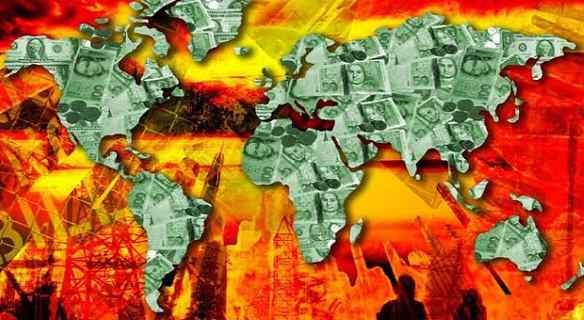Surviving Societal Collapse
Human history is rife with examples of fiat and hard currencies alike that have risen and fallen over time, often with disastrous results. Most famously, there were the bank runs and subsequent collapses of the 1930s and the ensuing Great Depression that enveloped the United States and many other countries (including Canada, Australia, Britain, Germany, etc.) while more recently there have been bank holidays and bank runs in Iceland, Sweden, Latvia .
A similar banking holiday and bank run here in the US, especially in light of the events of the late 2000s and through to this year, doesn’t seem entirely unlikely. With the level of financial turmoil and economic upheaval that accompanies such a bank run, there is very real potential for widely spread civil unrest and societal breakdown to ensue. To ensure that you, and your family, have the best chance to survive and continue to thrive, proper preparation is necessary.
Unfortunately, the people of today are even less prepared than their ancestors, especially here in the US. Family farms, once an archetype of the American way of life, are now a rare and increasingly limited thing of the past. Storing extra food or keeping a well-stocked pantry is practically unheard of, especially among the younger generations.
There are also more people now than ever before, living more densely in cities. Most people have never tended a garden in their life, let alone grown their own food crops or own the land necessary for it, so you can imagine the chaos and panic that will ensue in the face of any serious financial calamity.
There are many ways you can prepare yourself and protect your assets from the likelihood of an economic collapse or serious breakdown of civilization, though. One of the best ways you can protect yourself is to invest in hard assets that are tangible and retain their value despite the test of time. Owning arable land, and/or operating a farm in the spirit of our homesteading forefathers, is one good way to invest your wealth and protect your family.
Whether paper and/or hard currencies are still used, if history is anything to go by they are probably going to be hard to acquire and/or highly inflated and relatively worthless as a result.
Although a more reliable currency may be developed, during the period of chaos and upheaval there are many tried and true alternatives to traditional and fiat currency that can be used in trade and barter. Some of the most common things that have been (and still are) used as alternative currencies include:
- Tobacco and cigarettes have been used for decades as a substitute (or commodity based) currency for trade and barter. Whether or not you smoke, loose tobacco and tobacco products are a very good store of value, and are likely to be worth quite a lot more than you paid for them in the event of a serious crises.
- Alcohol, like tobacco, is always in demand somewhere, by someone, and can be used to trade and barter for many goods. Grain alcohol stores practically indefinitely, while high proof rums, vodka, gin and other liquors are very good for storing and trading. In addition to storing alcohol for trade or barter later, learning how to brew mead and beer or to distill your own alcohol can be an invaluable skill.
- Gold, silver and copper are some of the most common alternatives for those who wish to keep their wealth in a store of harder currency. Tried and true, precious and semiprecious metals have been used as a store of wealth for thousands of years. Older US coins, minted in 1964 and earlier, contain ~90% silver and are a good way to start a small silver collection. If you opt to invest in solid gold, silver or copper bullion, be sure to get chips or bullion in many smaller weights, including 1/8th, ¼, ½, and 1 oz. for ease of trade.
- Ammunition in a variety of calibers can not only save your life, but will also give you a rather powerful bargaining tool if SHTF and all hell breaks loose. Aside from stocking up on as much ammo as you reasonably can, be sure to purchase plenty of the most common calibers (9mm, .45, .22lr, 12 gauge, etc.) for use as bargaining chips and in trade. It probably won’t be like the days of the Wild West, but ammunition will likely be in limited or strictly controlled supply, so your stockpile will become valuable fast.
Those who own land or farms in the countryside are generally going to be at an advantage in the case of widespread societal collapse. Although a certain percentage of people will try to flee from cities and developed urban areas, thus posing a potential threat to your countryside location, the fact is that most of the masses either won’t leave or won’t get far from the cities they live in.
Not everyone is able to take action in the face of economic ruin, either, many people will go catatonic in shock, will hole themselves up in their home, or even commit suicide, unfortunately.
There are some other key ways that you can increase your chance of surviving, and potentially even thriving, in the event of widespread chaos and societal collapse. These include:
- Develop a close community when possible. In the event of any serious breakdown in society, when the police and local law enforcement, and potentially even the military, are overwhelmed or disbanded entirely, there will be greater safety in numbers. You need to be able to trust the people around you, though. In the country or another rural area, you should do your best to be on good, friendly terms with your neighbors so that you can watch out for one another. If you live in a city or another suburban area, try to keep your family and friends close, stay informed and make contingency plans together.
- Store spare parts and specialty oils, lubricants and other commonly needed tools for repairing various machinery. In the event of widespread chaos or the breakdown of society, production of these materials will decrease or stop entirely. Since stores, warehouses and storage facilities will be robbed and looted in short order, you will put yourself in a more powerful position to remain independent and self-sufficient by stocking up on needed supplies ahead of time. Spare parts, and general mechanical knowhow, will also give you powerful bargaining chips for barter and trade.
- Stock up on antibiotics and other pharmaceutical medicines, both over-the-counter and prescription. Medicine can become very hard, even impossible, to obtain in a crises and no one wants to die (or lose a child) due to a bad cold or the onset of diarrhea. Pain killers, anti-inflammatories, Imodium, iodine and other medicines can be purchased in most shops and local pharmacies or online. If you can’t get additional prescriptions from your doctor, one good alternative for sourcing antibiotics is to check with the vet. Antibiotics for pets, including penicillin (Fish Pen), amoxicillin (Fish Mox), and ciprofloxacin (Fish Flox) are available from the vet without any prescription and are identical to those used for humans.
Whenever possible, you should also stockpile extra food, water and other basic necessities of life, but these recommendations will put you in a stronger position to trade and barter for whatever you may need after a collapse but didn’t have a chance to stockpile. Perhaps more important than any other preparation you make, though, is your level of mental preparedness.
Disasters and crises situations exert a huge toll on humans psychologically and mentally; stress and fatigue can wear down even those who are reasonably well prepared in a material sense. Prepare yourself mentally and psychologically by developing a firm plan of action in the event of a critical emergency, and review your plans with your family and/or close friends.
Panic in a critical situation can be deadly, so by preparing ahead of time and knowing your plan of action by heart you’ll be calmer and have a clearer mind in the event of a real emergency.
Survival MD (Best Post Collapse First Aid Survival Guide Ever)
Backyard Innovator (A Self Sustaining Source Of Fresh Meat,Vegetables And Clean Drinking Water)
Blackout USA (EMP survival and preparedness)
Conquering the coming collapse (Financial advice and preparedness )
Liberty Generator (Build and make your own energy source)
Backyard Liberty (Easy and cheap DIY Aquaponic system to grow your organic and living food bank)
Bullet Proof Home (A Prepper’s Guide in Safeguarding a Home )
Family Self Defense (Best Self Defense Strategies For You And Your Family)
Sold Out After Crisis (Best 37 Items To Hoard For A Long Term Crisis)
SOURCE : www.survivopedia.com




